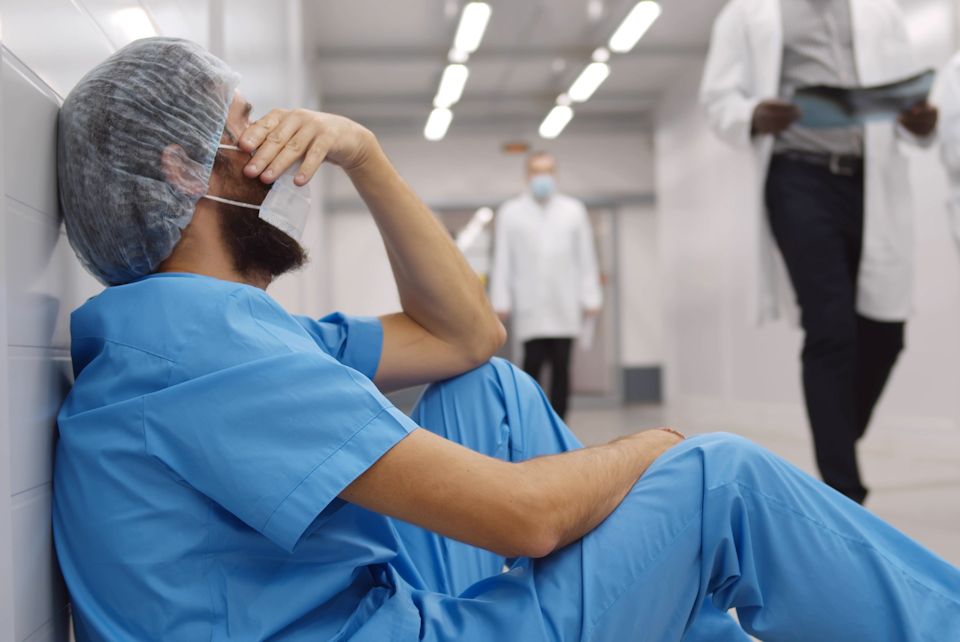Deacon Christina Wright serves as associate director of the hospital’s spiritual care team. She shares how chaplains have supported healthcare staff during the pandemic. The final of a four-part series.
CHRISTINA WRIGHT
Deacon, University of Michigan Health System
We often say that chaplaincy is a ministry of presence. In fairness to the field, it is much more than presence. Chaplaincy involves a careful assessment of spiritual well-being leading to interventions. Those interventions are designed to align with a patient’s own spiritual framework in order to strengthen spiritual wellbeing. But the pandemic has reminded us of how much our presence matters.
We emphasized supporting all our staff (healthcare workers) even before the pandemic. But as it began, we knew we had to work harder than ever to care for our staff. In the early weeks of the pandemic, chaplains began just walking the halls. In particular, we would round in the ICUs and COVID units. Those were very scary places, and when we asked how we could support the staff, they regularly said, just be here with us. They were just so grateful to see familiar faces in the trenches with them, to know that we were still there for them. Showing up matters.
In the early days of the pandemic, it seemed that there was constant change everywhere, and none of us had control over what was happening. I distinctly remember walking into work the first few days, with no mask yet, wondering if today was the day I would bring COVID home to my family. We didn’t know how the virus worked, what would keep us from getting it, and yet we were not able to stay safe working from home. I have never been one for gardening or landscaping, but I noticed a large patch of mud in our yard and decided that I needed to plant grass one day. I had never planted grass before, but it gave me something to nurture. There was a clear plan for how to help it grow. I would diligently water it every day when I got home from work, often still in my work clothes. And, eventually, it started growing. I became quite protective of the grass, keeping the dogs and lawnmower away from it, but I find it shockingly meaningful to have a small task that I could exert some control over and an opportunity to provide life and nourishment (even if it was “just” for grass) in the midst of so much fear and death.
Two years in, our worries now are different than they were two years ago. Then, we were so scared to bring COVID home to our families and didn’t know if we would have proper PPE. Now, we deal with burnout, low staffing, vaccine debates, and watching people still die from COVID as the rest of the world moves on. As with many areas, people are exhausted. In healthcare, that can cause life or death issues.
So, now one of the biggest challenges for chaplains working in healthcare is helping our colleagues find meaning in their work after two years of struggle. While we, as chaplains, can’t fix the underlying issues the pandemic has raised, we do work to give people moments of pause, times of reflection to remember their calling and the impact they are still having. We offer opportunities to see that they and their work matters.
The pandemic also taught our chaplains what a privilege it is to have access to patients and their families and be included in their care. Our hospital allowed us to remain onsite. When someone’s spouse couldn’t visit them for weeks on end but we could, that was both a privilege and a responsibility. It remains an honor for me and my staff to be able to care for folks on behalf of their clergy, families, and others.
It’s striking to think back to “before COVID.” We had no idea that our world would never be the same. There are so many lessons learned. One I like to reflect on is the notion that, as much as I wish we had never had to experience this pandemic, I also don’t want to go “back to normal.” We have learned a lot about systemic racism and privilege and access to healthcare and the ability to stay safe at home or not. We learned what is really needed to keep life going. Who became “essential” had nothing to do with education or salary. We learned about what activities were meaningful and which ones were just draining us, that our schedules didn’t actually have to be so hectic.
Over these past two years, we learned we could do really hard things. We moved worship services online. We homeschooled our kids. We Zoomed with our families for holidays. One of the biggest takeaways for me is to carefully evaluate all that we learned and not just go back to doing things how we did them before. We have learned some really important, meaningful lessons. We have discovered some creative new ways of doing things.
~ Christina Wright is a deacon of The Michigan Conference serving as the Associate Director of Spiritual Care at the University of Michigan Health System.
See also: Pastors face another COVID new year, Our God is bigger than COVID, and Rising above COVID with hope.
Last Updated on March 9, 2022

